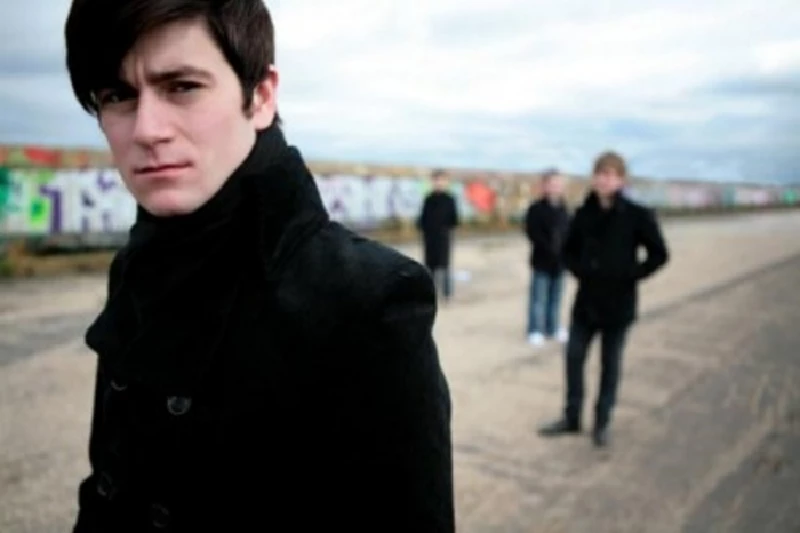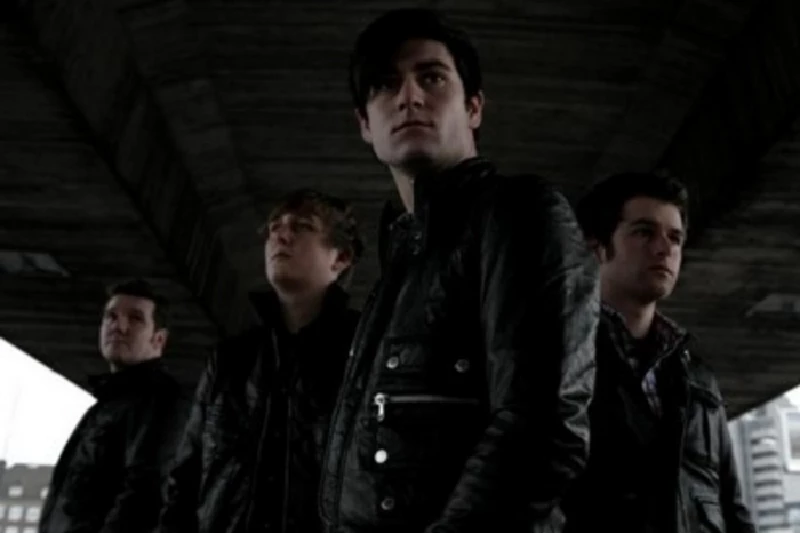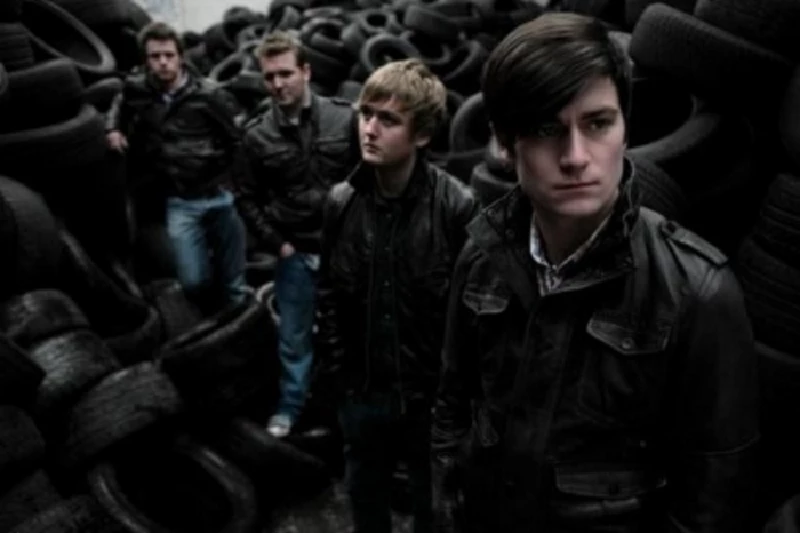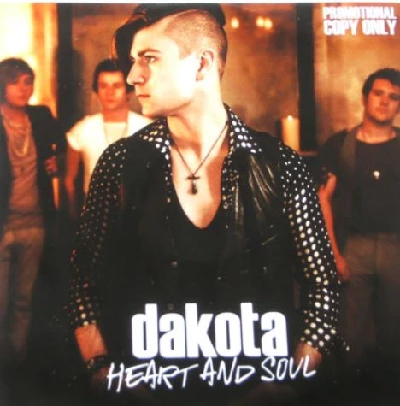Dakota - Interview
by Lisa Torem
published: 29 / 4 / 2010

intro
Lisa Torem speaks to Ben Talbot, the front man with young British pop band, about the romantic break-up that inspired the writing of their debut album, 'Heart and Soul'
“The sea seemed to lap up my pain and give me a new inspiration. It was the end of the summer and I didn’t think I had anything to look forward to,” lamented Ben Talbot of the four piece British pop band Dakota, describing the aftermath of barely surviving a broken heart. Talbot was referring to the beaches of Devon – somehow getting away to this sanctuary allowed him to pour his creative energies into the making of debut album 'Heart and Soul'. Talbot, who had taken up piano and guitar by 7, was already writing songs by 9. He and friends, Tom Davison, Rob Armitage and Aaron Wheelan, mastered dozens of Beatles songs, by practising night after night, and used that experience to create their own unique sound. Utilizing ambient noise, swirling guitar passages and heartfelt vocals, this release encapsulated all stages of Talbot’s agony. Compared to the Cure, Morrissey and the Pet Shop Boys, but delving even more deeply into edgy emotional terrain, Dakota – named after the apartment in which John Lennon lived and died – is garnering major momentum in the UK. Ben Talbot talks to Pennyblackmusic writer Lisa Torem about his songwriting proclivities and how creating 'Heart and Soul' ultimately allowed him to conquer the pain of lost love. PB: I’ve been really enjoying listening to your new album. Let’s talk about the ten tracks on ‘Heart and Soul.’ ‘On My Own’ sets the mood immediately with soft vocals and a tug of yearning. "Say you won’t be gone for long/Sitting here something seems so wrong/I wish you were on your way back home." I think there’s an innocent vulnerability that comes across straight-away captured through simple but heartfelt lyricism and an instrumental backing that deepens the mood. What was the process involved in terms of first creating the chord changes and lyrics and then production decisions? BT: I’m glad you like the album. I always wanted ‘On My Own’ to be a big opener for the album. Starting off small and building like an emotion which starts off as a tiny thing and builds and builds until it consumes your life. Musically, I wanted this track to reflect the journey I had been on and to act as an overture to set the scene of what happened in my life during this period. PB: ‘Wild Child’ has a more comprehensive narrative. You paint a picture of this spoiled country girl who virtually “loses it” once she is out of the protection of her father figure. “She used to be such a good girl/She used to be so shy/His precious little girl has gone astray.” Is this a stunning portrait of someone you know, or have known or does it represent generally that rebellious stage that so many young people go through? BT: ‘Wild Child’ is a portrait of the girl who broke my heart. About a year after our relationship ended, she invited me to her birthday party. I shouldn’t have gone, but I did and was horrified to see how she had changed. I wrote this song on my way home. PB: I notice in ‘Why Don’t You Like Me?’ that the opening guitar riffs are abrupt and confident, but the mood reflected is so fragile. "Why don’t you like me/Want me?/The way I want you/You/You…" Was that deliberate? BT: To be honest, this is just the way it turned out. PB: ‘She’ begins with strumming and escalates with another intimate character portrait: “She lives in the city/Cars passing by/Petrol fuel makes her feel so high/She doesn’t know which way to turn." Do these images apply to the part of you that has been grieving about your lost love? BT: ‘She’ is about everyone who feels lost in this world and who has ended up not quite where and how they thought they would. PB: ‘We Get Along’ begins in a melancholy way, but tends toward optimism, “Your heart’s been broken, bruised/Your friends have all gone home.’ By the end of the song, however, there’s a resolution. The two characters heal each other in some way. Is that what you meant to say? BT: ‘We Get Along’ is a song about feeling rejected and depressed and partying every night to take the pain and emptiness away. People think you’re having a good time, but it’s just a façade. It’s about trying to survive really. So, no, there’s not really a resolution at the end. It ends, “Dreams fade away” – a pretty pessimistic ending, I’m afraid. PB: ‘Taking Over’ has these compelling harmonies. There’s even some call and response vocally. Was this song intended to make more of a statement about romance than the rest? BT: In ‘Taking Over’ the intention is to capture the compulsive magic of falling in love. It is a reminder of what has been lost. PB: ‘Can’t Remember’ starts out as almost disturbing due to its jarring chord progression. "Old photographs upon the wall/She doesn’t recognize it all/Carefree days when we were young." Is this the same girl that’s been referenced in the other songs or is the characterization incidental to the theme; is this song created as a way to erase the tragedy of heartache? BT: This song is actually inspired by my grandmother starting to lose her memory. It is about the poignancy of an old lady not remembering her lover and everything that was meaningful in her life. A faded rose kept in a tin was the rose he gave her, which once reminded her of him and which was once her most treasured possession, but now means nothing because the memories have all gone. Likewise, also gone, were the old photographs of her with him in her youth on a beach – treasured memories now all forgotten. But the image of two lovers on a beach also cross-references to my own situation and happy memories walking on a beach when I first met the girl who broke my heart and who inspired the album. That’s why when I sing it I change the written words of the song from carefree days when she was young to carefree days when we were young. I put this song in the album because it is about the theme of lost love – but adds a different dimension – losing memories of love. In fact one of the most upsetting aspects of the break up with my girlfriend was the fact that she didn’t seem to remember the magic of the time we spent together. PB: ‘Closure Song’ is a ballad with an orchestrated introduction and the theme exudes remorse, "I thought we’d be forever." I almost feel as if this album is a prequel to another stage of life; you have defined the harrowing stages of love so well here and I’m wondering if you will follow up with an album which explores other elements of human emotion. BT: I have still got plenty more songs about love already written and more still to write. But the next album will cover a more varied subject matter with more lyrics written in the third person. PB: Tell me about the other band members, how you came together and about the long range plan? BT: Aaron is lead guitarist and the most laid-back person I know. Rob is the drummer and baby of the band. Rob likes to party. Tom plays bass. He is a computer whiz and is endlessly busy with our website, my space and face book, as well as finishing a degree at Manchester University. I’d known Tom for a good while before I even realized he played guitar, which is crazy. We met Aaron and Rob when I moved to Warwickshire in autumn in 2008. Our long range plan is to break Europe, America and the rest of the world. PB: I think it’s fascinating, Ben, that your characterizations depict women so frequently. Would you say that in making this decision you have distanced yourself from the emotion of heartbreak or led yourself right toward the chopping block? Is it easier to write a song based on a female character than a male character? Does it matter? BT: I have written songs about men, but I write predominantly about my own emotions or about women, because I have had close relationships with women. Does it matter? In songs like ‘She’ it doesn’t matter – the words could apply to someone of either gender. PB: How much vocal training have you had and who are your favourite vocalists? Also, who are your favorite songwriters and which songs have inspired you to perfect your craft? BT: I have only had vocal training when I was a child. My favourite vocalists are Morrissey, Michael Jackson, Andrew Montgomery (of the band Geneva), Kiri te Kanawa, Cerys Matthews. My favorite songwriters: Richie James of the Manic Street Preachers was an inspired lyricist and, combined with James Dean Bradfield’s ear for melody they made a fantastic team. Michael Jackson always knew how to write an amazing pop song. Songs that inspired me: 'Life Becoming a Landslide' (Manic Street Preachers) 'The Master Plan' (Oasis) 'Tranquilizer' (Geneva) 'The Wild Ones' (Suede) 'Something’s Changed' (Pulp) 'Strange Glue' (Catatonia) 'The Long and Winding Road' (Beatles) 'Man in the Mirror' (Michael Jackson) 'Closer Now '(Keane) 'Daniel' (Elton John) 'Rewind' (Stereophonics) PB: Has this album been a healing experience? BT: Yes, it was a healing experience to write these songs. But recording and perfecting these songs in the studio was a constant reminder of the pain I had felt. PB: What is your process for writing? BT: It can either start from the concept of a song which I have in my head or a melody which I have in my head. Often I write a whole song in my head before I get to a piano or a guitar. Alternatively, ideas will come when I’m playing the guitar or piano. PB: Have you collaborated with the other band members? BT: Not on this album but on some later songs which will feature as B sides and on future albums. PB: Were your family members musical? BT: Yes my grandmother was a music teacher and pianist. I spent a lot of time with her as a child and she instilled a love of music in me. PB: Why did you name the group after the building in which John Lennon and Yoko Ono lived? Have you been there? BT: Actually I just loved the name Dakota. I am a Lennon fan and I love New York, but there’s not just the association with the building where he lived. I thought Dakota was a good name for a band. The US states of South and North Dakota are called after the Dakota Sioux American Indian tribes. There are The Black Hills of Dakota and famous Dakota aero planes. The only problem is that if you Google just “Dakota” you don’t just get us, but you get a whole list of other Dakotas including Dakota Fanning and Dakota Night Club and not to mention the Dakota Sausage Stuffer! But if you Google “Dakota Band” you will find us straight away. PB: How would you describe Dakota’s unique sound? How does it differ from other contemporary bands in the UK? BT: A recent reviewer summed up our sound on ‘Heart and Soul’ pretty well, I think, as “rock infused pop, laced with angst and heartbreak.” We don’t try to be cool and follow musical fashion. We just try to make good music which we believe in. PB: What are your plans for touring? BT: We plan to play at some festivals and tour in the summer. PB: Thank you and the best of luck with your career. BT: Thank you very much.
Picture Gallery:-


reviews |
|
Heart and Soul (2010) |

|
| Evocative and touching rock on confessional debut album from young British band Dakota |
most viewed articles
current edition
Spear Of Destiny - InterviewRobert Forster - Interview
Fiona Hutchings - Interview
When Rivers Meet - Waterfront, Norwich, 29/5/2025
Carl Ewens - David Bowie 1964 to 1982 On Track: Every Album, Every Song
Brian Wilson - Ten Songs That Made Me Love...
Pistol Daisys - Waterfront, Norwich, 29/5/2025
Gary Numan - Berserker
Deb Googe and Cara Tivey - Interview
Roberta Flack - 1937 - 2025
previous editions
Heavenly - P.U.N.K. Girl EPBoomtown Rats - Ten Songs That Made Me Love....
Dwina Gibb - Interview
Trudie Myerscough-Harris - Interview
Oasis - Oasis, Earl's Court, London, 1995
Sound - Interview with Bi Marshall Part 1
Susie Hug - Interview
Chuck Prophet - Ten Songs That Made Me Love...
Ray Humphries - Interview
Sukie Smith - Interview
most viewed reviews
current edition
Peter Doolan - I Am a Tree Rooted to the Spot and a Snake Moves Around Me,in a CircleGarbage - Let All That We Imagine Be The Light
Little Simz - Lotus
Suzanne Vega - Flying With Angels
John McKay - Sixes and #Sevens
Vultures - Liz Kershaw Session 16.06.88
Billy Nomates - Metalhorse
HAIM - I Quit
Vinny Peculiar - Things Too Long Left Unsaid
Morcheeba - Escape The Chaos
Pennyblackmusic Regular Contributors
Adrian Janes
Amanda J. Window
Andrew Twambley
Anthony Dhanendran
Benjamin Howarth
Cila Warncke
Daniel Cressey
Darren Aston
Dastardly
Dave Goodwin
Denzil Watson
Dominic B. Simpson
Eoghan Lyng
Fiona Hutchings
Harry Sherriff
Helen Tipping
Jamie Rowland
John Clarkson
Julie Cruickshank
Kimberly Bright
Lisa Torem
Maarten Schiethart